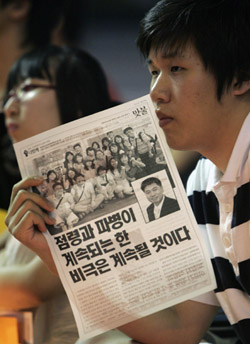South Korean envoy heads to Afghanistan
(AP)Updated: 2007-07-27 00:35 KABUL, Afghanistan - A top South Korean official headed to Afghanistan on Thursday on a mission to secure the release of 22 Christian volunteers held captive by Taliban kidnappers after the militants killed a hostage.
A local police chief said negotiations with the Taliban captors have been difficult because their demands were unclear.
"One says, 'Let's exchange them for my relative,' the others say, 'Let's release the women,' and yet another wants a deal for money," said Khwaja Mohammad Sidiqi, police chief in Qarabagh. "They have got problems among themselves."
After conflicting reports that possibly eight of the other hostages had been released, presidential spokesman Chun Ho-sun said the 22 South Koreans were still believed held but were not suffering health problems.
In new violence, US-led coalition forces and Afghan troops fought two separate battles with militants in southern Afghanistan, killing more than 60 suspected Taliban insurgents. A NATO soldier was killed in another incident, officials said.
On Wednesday, authorities found the bullet-riddled body of 42-year-old Bae Hyung-kyu in Qarabagh district of Ghazni province, where the South Koreans were abducted July 19. Bae, a deputy pastor and a founder of Saemmul Presbyterian Church, was killed on his birthday, church officials said.
Bae was found with 10 bullet wounds in his head, chest and stomach, said Abdul Rahman, a police officer. Another police official, who asked not to be identified because of the sensitivity of the situation, said militants told him the hostage was sick and couldn't walk, and was therefore shot.
A church official confirmed that Bae previously had suffered from lung disease and was still taking medicine.
Bae's mother, 68-year-old Lee Chang-suk, broke into tears as she watched the televised government announcement of his death. "I never thought it possible," she said from the southern island of Jeju, according to Yonhap news agency.
The kidnappers "will be held accountable for taking the life of a Korean citizen," Baek Jong-chun, South Korea's chief presidential secretary for security affairs, said before leaving for Afghanistan.
Chun said South Korean President Roh Moo-hyun had spoken with his Afghan counterpart Hamid Karzai on the situation.
Qari Yousef Ahmadi, a purported Taliban spokesman, said all 22 hostages were fine but claimed Afghan authorities were not allowing South Korean officials to negotiate directly with his group.
The hostages were being held in small groups in different locations, he said, and were being fed "the same food that our villagers have -- bread, yogurt, rice."
Ghazni Police Chief Ali Shah Ahmadzai said the Afghan negotiators were speaking with the Taliban over the phone.
"We will not use force against the militants to free the hostages," he said, adding was hopeful about reaching "some sort of deal for the release of six up to eight people" later Thursday.
Marajudin Pathan, the governor of Ghazni province, said militants have given a list of eight Taliban prisoners who they want released in exchange for eight Koreans.
An Afghan official involved in the negotiations earlier said a large ransom would be paid to free eight hostages. The official also spoke on condition he not be identified, citing the matter's sensitivity. No other officials would confirm this account.
Foreign governments are suspected to have paid ransoms in Afghanistan in the past, but have either kept quiet or denied it.
The South Koreans, including 18 women, were kidnapped while on a bus trip through Ghazni province on the Kabul-Kandahar highway, Afghanistan's main thoroughfare. Because of a recent spike in kidnappings, police announced that foreigners are no longer allowed to leave Kabul without their permission.
The South Korean church has stressed that the abducted Koreans were not involved in any Christian missionary work, saying they provided only medical and other volunteer aid.
Two Germans were also kidnapped last week. One was found dead and the other apparently remains captive. A Danish reporter escaped a kidnap attempt Wednesday in eastern Afghanistan.
In the fighting in southern Afghanistan, coalition forces and Afghan troops hit buildings in Helmand province that militants have been using to launch attacks. More than 50 Taliban were killed and several others were wounded in a 12-hour gunbattle.
"Coalition air support dropped two bombs on the compounds with the greatest concentration of insurgents," the coalition said. "Both compounds produced significant secondary explosions immediately suggesting a large quantity of explosive material was present in each."
The clash occurred near the village of Musa Qala, where a peace deal struck last year with local elders effectively ceded control of the area to Taliban fighters.
In neighboring Kandahar province, a clash left 10 suspected militants and one policemen dead, said Sayed Afghan Saqib, Kandahar provincial police chief.
A NATO soldier was killed following a clash with militants in southern Afghanistan, the alliance said.
A suicide car bomber, meanwhile, detonated himself near a NATO convoy in Kandahar, but there were no injuries among the troops, said Lt. Desmond James, a Canadian officer at the scene.
Violence has risen sharply in Afghanistan in the last two months. More than 3,500 people, mostly militants, have been killed in insurgency-related violence this year, according to an Associated Press tally of casualty figures provided by Western and Afghan officials.
|
|
|
||
|
||
|
|

